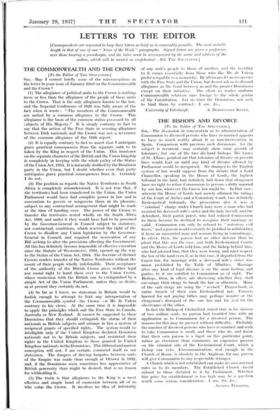THE BISHOPS AND DIVORCE [To the Editor of THE SPECTATOR.]
SIR,—The discussion in convocation as to administration of Communion to divorced persons who have re-married appears to have as much reality about it as non-intervention in Spain. Comparison with previous such discussions for the subject is recurrent—may certainly show some growth of tolerance, but one of the two die-hard bishops, His Grace of St. Albans, pointed out that tolerance of divorce on present lines would lead on until any kind of divorce allowed by Parliament would be recognised. No stranger to the English system of law would suppose from the debate that a Lord Chancellor, speaking in the House of Lords, the highest tribunal in the land, had definitely laid down that clergymen have no right to refuse Communion to persons validly married by our law, whatever the Canon law might be. In that case, wherein the House of Lords had merely affirmed the rulings of the Court of Arches and a Consistory Court, two definitely Ecclesiastical tribunals, the prosecutors (for it was a " criminal " charge under Church law) were a 111/111 who had married his deceased wife's sister and the lady herself, and the defendant, their parish priest, who had refused Communion to them because he declined to recognise their marriage a; valid. Communion can only be refused to " notorious evil livers," and a parson would certainly be justified in withholdin:z it from an unmarried man and woman living in concubinage. In effect, then, the parson had no other defence than to plead that this was the ease, and both Ecclesiastical Courts and the House of Lords told him, and the bishop behind him, who had advised him, that they were wrong, and must respect the law of the land even if, as in this case, it departed from the Canon law, for marriage with a deceased wife's sister was union prohibited by the Table of Affinities. Marriage after any kind of legal divorce is on the same footing, and parties to it arc entitled to Communion as of right. The Bishops, then, in effect, are discussing whether they shall encourage their clergy to break the law or otherwise. Many of the said clergy are using the " revised " Prayer-book, in entire breach of their own Ecclesiastical law. Farmers harried for not paying tithes may perhaps wonder at the clergyman's disregard of the one law and his zeal fur the observance of the other.
In fact the Bishop of Chelmsford stated that, in his diocese of two million souls, no parson had troubled him with an application as to Communion for a divorced person. The reasons for this may be guessed without difficulty. Probably the munber of divorced persons who have re-married and wish to take Communion is small, and those who do, and know that their own parson is a bigot on this particular point, rather go elsewhere than commence an expensive process on the criminal side of the Ecclesiastical Court, which a bishop can veto. Excommunication, real enough in the Church of Home, is obsolete in the Anglican, for any parson will give Communion to any respectable stranger.
A Church which is not established can make its own internal rules as to its members. The Established Church yho:ild submit to those dictated to it by Parliament. Whether this price for establishment is too high may be a question worth sonic serious consideration.- - I am, Sir, &c., ALFnEn FELLOWS.






















































 Previous page
Previous page